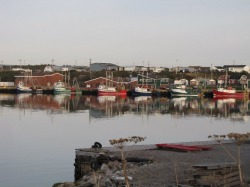Anyone to take the bait?

Yaffle.ca is Memorial's online connecting tool. One of its most significant jobs is to provide a way for people from outside Memorial to ask for research help. With hundreds of community-suggested opportunities to choose from, your next project is just a click away. Here's one . . .
The Opportunity: The lobster fishery helps support the lives of many families on the Great Northern Peninsula. Although it is a lucrative line of business, there are issues surrounding the increasing cost of bait. Some traditional bait fish are now being fished for human consumption, thus increasing their price.
“There must be more sustainable, local and cost effective solutions for providing bait for the lobster fishery,” said Carolyn Lavers, Mayor of Port aux Choix. “The shrimp processing plants throughout the Peninsula send their waste out to sea and to landfills; however, maybe there is a way to process this waste for local fish harvesters to use as bait instead.”
In addition, there may be opportunities to utilize aquatic invasive species as bait. “There are invasive species coming here, such as green crab, which are detrimental to our environment. Why don’t we see if these species could be harvested and sold as bait? This would help get them out of the ocean while providing a more cost-effective bait source for fish harvesters,” added Mrs. Lavers.
The Project: Mrs. Lavers would like someone from Memorial to look at the feasibility of utilizing shrimp waste or invasive species as bait for the local lobster fishery. A study could be undertaken to provide a review on whether either of these ventures have been undertaken elsewhere, and if so, what lessons were learned that could inform the development here.
A project could also take a biological or chemical perspective, to see if the shrimp waste or invasive species would be suitable for processing into bait. In addition, research could take an engineering perspective, to determine what equipment would be appropriate for processing the bait.
Mrs. Lavers is available to provide information on the region, and she could connect a potential researcher with local people working in the fish harvesting and processing industries. An ideal outcome from her perspective would be for a local person or company to develop a successful venture that provides new bait sources, not only for the benefit of themselves, but for their community and region as well.
Interested in learning more about this project? The Harris Centre’s co-ordinator of knowledge mobilization would be happy to tell you more. Call Amy Tucker at 709-864-6115 or email amy.tucker@mun.ca.